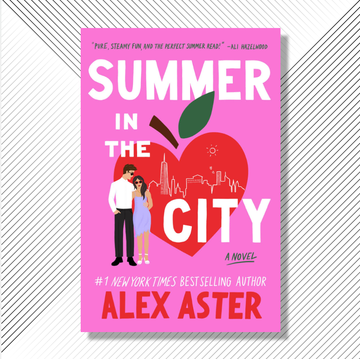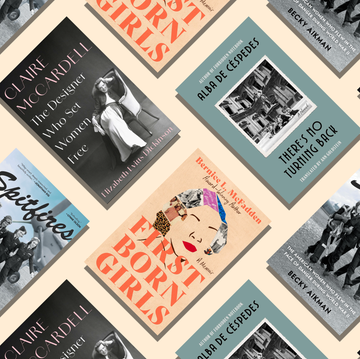On April 14th, Amanda Nguyen will make history when she blasts off with our very own Gayle King on the first-ever all-female space crew. But the bioastronautics research scientist and Time’s Woman of the Year has already made history right here on Earth. In 2013, Nguyen was raped at Harvard University, where she was completing the final semester of her senior year. She was determined not to let the attack derail her plans of becoming an astronaut, but when she learned that her rape kit would be destroyed after six months, she was forced to choose between pursuing justice or chasing her dreams. She chose both. Rather than simply going to court for herself, she went to Congress for all survivors, helping to draft the Sexual Assault Survivors’ Rights Act, to guarantee, amidst other rights, the preservation of rape evidence. In 2016, the federal bill passed unanimously through the House and the Senate.
This is where her new memoir, Saving Five, leaves off: with the passage of her first law. But it is far from where her story ends. Nguyen took her fight for justice to the international stage, drafting the United Nations General Assembly resolution for survivors of sexual violence, the first legislation recognizing rape as a standalone issue in peacetime. The resolution took six years to pass. Throughout her tireless advocacy, she kept her sights on the stars. In 2021, she enrolled in the International Institute for Astronautical Sciences. “I had to relearn trigonometry,” she laughed. Needless to say, she graduated at the top of her class.
I got to speak with Nguyen the day that her memoir hit shelves to hear how she transmuted her anger into activism and how she’s preparing for blastoff.
What’s the first thing you’re going to do when you make it to space?
Well, all astronauts have a zero gravity indicator: it’s something small that floats, once we hit space, that lets us know we have arrived. My zero-g indicator is the note that I wrote to myself after I left the hospital: Never, never, never give up. I had taped it to my laptop. I stared at it to help me graduate college. I stared at it when I was passing my rights in Congress and in the United Nations, and I will be staring at it over Earth.
One of the most powerful moments in your memoir is when, shortly after returning from the hospital after your assault, you learn that fewer than 20 percent of rapes are reported and for every 100 women, 99 will never see justice. In that moment, what made you believe that you could not just defy the odds but create systemic change?
To be honest, I didn’t know that I could do that, nor did I really even believe that I could. I just knew that that was the right thing to do, and I was so mad. I will say that anger fuels movements and it undoubtedly helped me. I was relentless. I lived with a clock over my head. Every single second that passed by was a second less that I had towards preserving the evidence of my rape kit because it was on a timeline of destruction at six months. I could not eat, sleep, or do anything without literally having that countdown in the back of my mind. So it really hung over me. But, eventually—after my first law passed and I was able to get that justice in the way that I defined justice—that rage changed. It shifted towards hope.
It sounds like anger really was your rocket fuel, for lack of a better term. Do you have advice for how others can use rage to propel them forward rather than allowing it to consume them?
You know, fire exists in many different forms. In order for it to propel you, you need to have a place where you’re trying to go. And that is my greatest word of experience—I wouldn’t say “word of advice,” because everyone has their own experience—but to share from mine, I was able to process by finding the momentum in justice and defining my own justice. Justice means different things to different people. For me, it isn’t mainly from the courts. It’s making sure that no one has to go through what I went through, and when these rights were signed into law, that was my form of personal justice.
What happened to your kit after you passed the law? Did you end up seeking prosecution in your own case?
I preserved my ability to. The statute of limitations is 15 years, and the reason why a statute of limitations exists for that long is because of the recognition that trauma impacts people’s lives, and it takes time for victims, for survivors, to go back and revisit that point of their lives. One of the catalyst moments for me was when these legal professionals told me that rape cases take years, and while they’re ongoing, you should plan on it being all-consuming. I fought for my ability to pursue justice at a later point in my life. I’m living my life right now, and perhaps in the future, I may revisit it.
You put your astronaut ambitions on hold for almost a decade to change national and international laws. How does it feel to finally be making it to space?
It’s the biggest full-circle moment for me. I hope I’ll be able to share with survivors around the world—or really, anyone who’s had a dream deferred—the idea that we can honor the person we were before we were hurt. I understand how lucky I am to have had my justice, to have fought for it, to have proposed a law and see it passed and be credited for it and be able to return to that person I was and the dreams that she had.
You will be bringing the letter you wrote to yourself after the assault. What else will you be bringing with you on your voyage?
My call sign is Dragon, which is a reference to my heritage. Vietnamese legend says that our people descended from dragons and fairies, but also my great, great, great, great—seven times—great-grandmother was an empress of Vietnam, and the Nguyen family crest is a dragon. So I’ll be traveling with a coin from her reign. My dad’s side is the royalty side. My mom’s side is the polar opposite. She comes from rural farmers in Vietnam, and she was a boat refugee. She and my aunt were on Pulau Bidong and so I traveled there, and I will be flying with the shells from that refugee Island.
I will also be bringing materials for the two experiments I will be conducting in space. One is on women’s health, namely menstruation. This flight is making history as the first all-women mission in space. NASA barred women from becoming astronauts in the beginning. One reason that they cited was because of menstruation. They didn’t have the data to back that up, but I will be gathering data to back up my own hypothesis, which is that women’s bodies are actually very fit for space. What I’m specifically doing is analyzing wound dressing in microgravity. The overarching application is for wound dressing, but the materials that I’m specifically using and the application that I’m most interested in is menstruation.
I’m also bringing seeds for a plant pathology experiment with the Vietnam National Space Center and scientists from the University of Wisconsin, Madison. It’s on how plants respond to microgravity. The purpose of it is to make sure that, as we do long space missions, we’re able to sustain astronauts by growing their own food. These seeds are really special. They’re fast-growing seeds—actually, they’re called fast plants—and then the type I’ll be working with was cultivated by women in Southeast Asia. It is a coincidence that those types of seeds trace their lineage back to where my family came from.
You will be the first Southeast Asian woman and the first Vietnamese woman to leave the Earth’s orbit. What does that mean to you?
I’m so grateful. This year marks the 50th anniversary of the war and the 30th anniversary of reconciliation between the United States and Vietnam, the two countries that make up my heritage and were former enemies. And so it really is an honor to be able to use science as a tool for peace, conducting a science experiment in partnership with the Vietnam National Space Center. I definitely want Vietnamese girls to see themselves in the stars. I might be the first, but I certainly won’t be the last.
I will be bringing my Vietnamese family with me when I board the ship. All astronauts ring a bell before stepping into our capsule. And that bell comes from the nautical tradition of where space flight comes from. It’s a spaceship. And when I ring that bell, it will be a deeply emotional and personal moment for me. My family learned celestial navigation to find their way to freedom as boat refugees. I will be thinking of the sailors in my life when I ring that bell. They came on boats, and now I’m on a spaceship, and I want so many folks just to see that and realize that our dreams are possible no matter where we come from.
How are you preparing for the flight?
I think the biggest thing that I am really being intentional about is the communities that I want to uplift, you know? This is meant to be a leverage point to push justice further. The UN resolution did change the world, but the next step for us is getting a universal jurisdiction treaty passed. Universal jurisdiction exists for other crimes right now, like torture, murder, and drugs, but it doesn’t exist for rape. I am using this flight as a spotlight to be able to move world leaders to sit down with me and get some more rights on the books. It’s sometimes a little flashier and easier to get to a meeting when you can throw in astronaut, or, like, history-making astronaut.

Charley Burlock is the Books Editor at Oprah Daily where she writes, edits, and assigns stories on all things literary. She holds an MFA in creative nonfiction from NYU, where she also taught undergraduate creative writing. Her work has been featured in the Atlantic, the Los Angeles Review of Books, Hyperallergic, the Apple News Today podcast, and elsewhere. You can read her writing at charleyburlock.com.














